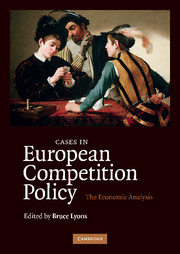Book contents
- Frontmatter
- Contents
- Contents by potentially anticompetitive business practices
- Contents by markets
- List of figures
- List of tables
- List of contributors
- Preface
- Introduction: the transformation of competition policy in Europe
- A Anticompetitive behaviour by firms with market power
- Introduction
- A.1 Abuse of a dominant position
- 1 Michelin II – The treatment of rebates
- 2 Interoperability and market foreclosure in the European Microsoft case
- A.2 Market investigations
- B Agreements between firms
- C Mergers
- Bibliography
- Index
2 - Interoperability and market foreclosure in the European Microsoft case
Published online by Cambridge University Press: 05 June 2012
- Frontmatter
- Contents
- Contents by potentially anticompetitive business practices
- Contents by markets
- List of figures
- List of tables
- List of contributors
- Preface
- Introduction: the transformation of competition policy in Europe
- A Anticompetitive behaviour by firms with market power
- Introduction
- A.1 Abuse of a dominant position
- 1 Michelin II – The treatment of rebates
- 2 Interoperability and market foreclosure in the European Microsoft case
- A.2 Market investigations
- B Agreements between firms
- C Mergers
- Bibliography
- Index
Summary
Introduction
The cases in the US and Europe against Microsoft have been perhaps the most high-profile antitrust cases in the last twenty years. In the various Microsoft cases, antitrust authorities in the US and Europe took on what was at some points the most valuable company in the world and its CEO Bill Gates, the world's richest man. After five years of investigation, on 24 March 2004, the European Commission held Microsoft guilty of an abuse of a dominant position under Article 82 and imposed the largest fine ever for such an antitrust violation in Europe – €497 million. The Commission also demanded major forward-looking behavioural remedies including compulsory licensing of intellectual property and forced unbundling. This degree of behavioural intervention is highly unusual and led to continued conflict about the implementation of the remedies.
The Decision found that Microsoft had abused its dominant position in the PC operating system market in two ways:
‘deliberately restricting interoperability between Windows PCs and non-Microsoft workgroup servers, and
by tying its Windows Media Player (WMP), a product where it faced competition, with its ubiquitous Windows operating system.'
As remedies for these violations the European Commission ordered Microsoft:
‘within 120 days, to disclose complete and accurate interface documentation which would allow non-Microsoft workgroup servers to achieve full interoperability with Windows PCs and servers’;
‘within 90 days, to offer to PC manufacturers a version of its Windows client PC operating system without Windows Media Player’.
The case is fascinating as it touches on one of the key issues concerning the conduct of modern competition policy': how should we think about the role of antitrust in high-tech industries dominated by rapid innovation?
- Type
- Chapter
- Information
- Cases in European Competition PolicyThe Economic Analysis, pp. 50 - 72Publisher: Cambridge University PressPrint publication year: 2009
- 5
- Cited by



